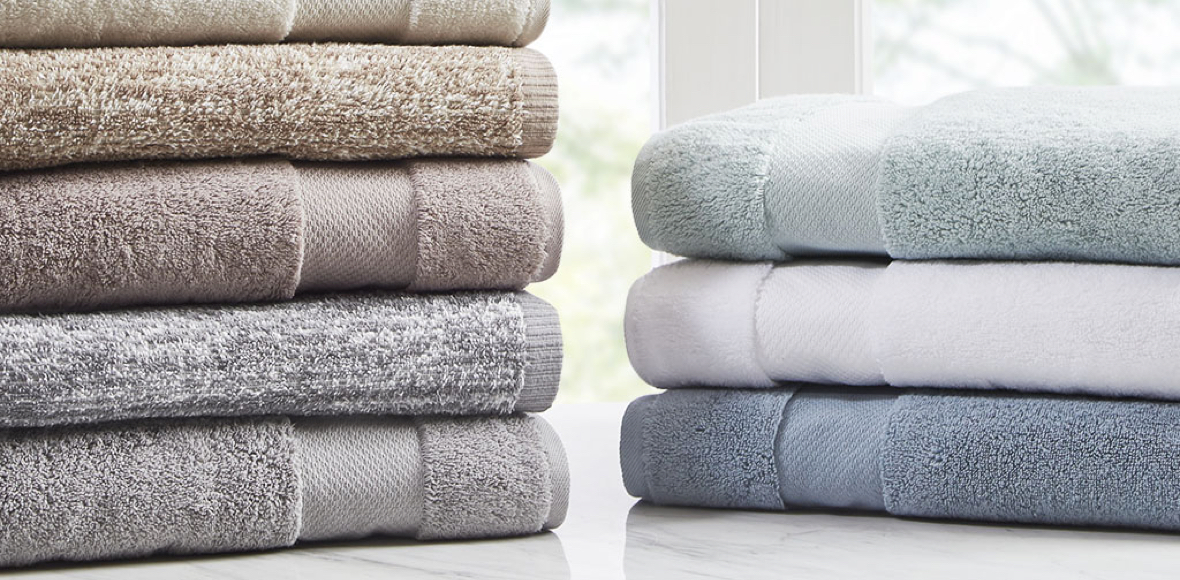
When shopping for bath towels, you will come across many different options including a variety of sizes, styles, thread counts, types of cotton, and so forth. It can easily become quite an overwhelming process to search for the right towel to buy, but fortunately, we are here to help! In this comprehensive guide, we will walk you through the basics of choosing the right towel for your needs, and specifically, we will outline the differences between Egyptian and Turkish Cotton towels and tell you why someone might choose one over the other. The good news is, if you are trying to decide between Turkish vs Egyptian cotton towels, you are already on the right path, as both of these materials are very high quality.
Types of Towels
Before you can choose a fabric for your new towel, you’ll need to narrow down what type of towel you are shopping for. ‘I just want a towel!’ is a common response, but many people do not realize that there are a variety of towels available with different intended uses. In this section, we will outline the main kinds of towels you can buy and what they are typically used for.
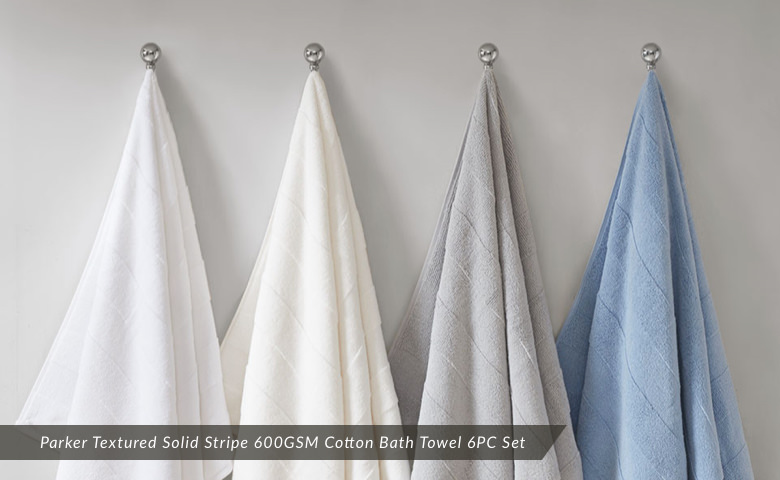
Bath Towels
It is more than likely that if you are reading this article about Turkish cotton vs Egyptian cotton towels that you are shopping for a bath towel. Bath towels are what we normally envision when we think ‘towel’. These items are there for you when you are getting out of the pool, the shower, the spa, or even the ocean. The primary use of a bath towel is to dry your body after coming in contact with water. The most common size for a bath towel is 27 inches by 54 inches. However, ‘oversize’ bath towels exist in a variety of larger dimensions. Additionally, some styles of towels, such as Turkish towels, which we will get to a bit later, come in a different standard size than a ‘regular’ bath towel.
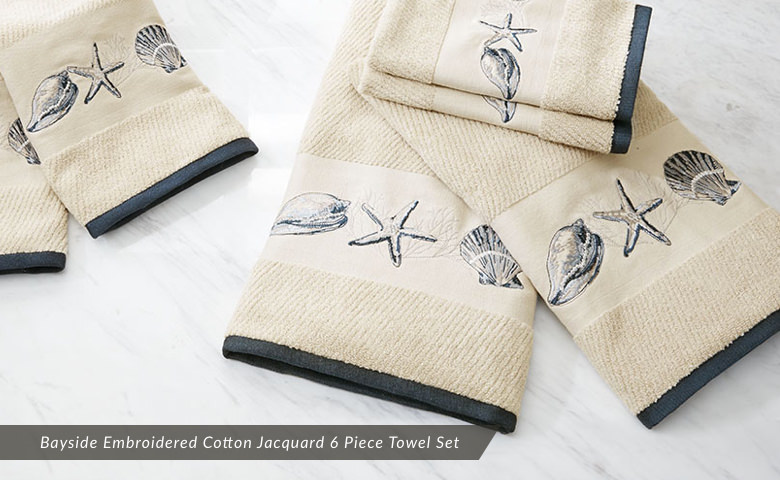
Hand Towels
Hand towels can be utilized in a myriad of ways. They are smaller than bath towels and typically measure in at about 16 inches by 30 inches. You will generally find hand towels hanging near a sink, where they are easily accessible for the purpose of drying your hands after you wash them, hence their namesake. However, hand towels can also be used as gym towels, rags, in the kitchen, at salons, and in spas. Like bath towels, hand towels come in a variety of different materials, including both Turkish and Egyptian cotton.
Washcloths
Washcloths are similar to hand towels but tend to be even smaller. They are generally characterized by a small, square footprint no larger than 15 inches by 15 inches. These handy little towels can be brought into the shower or spa with you and are used to wash the face and body. Alternatively, washcloths can be used as rags in bars, hotels, and kitchens. While you can find washcloths in a variety of materials, it is less common to see them made with high-quality fabrics such as Turkish or Egyptian cotton.
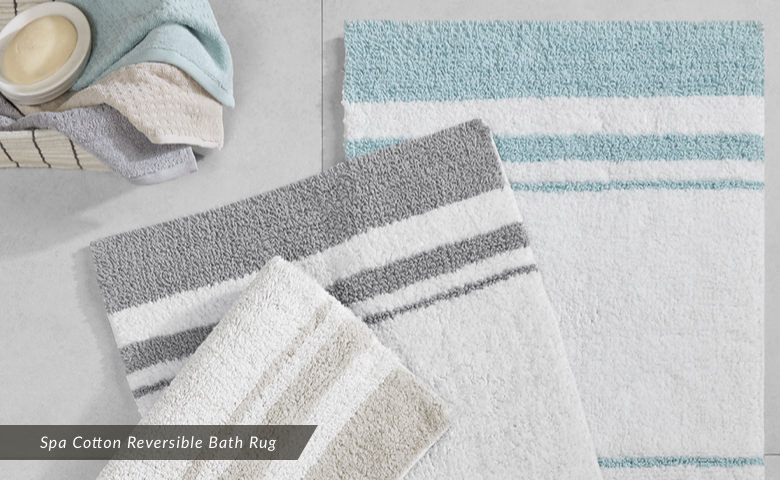
Bath Mats
Bath mats are typically about the same size as bath towels, and they are used on the floor just outside of showers, baths, and spas. They are considerably thicker than their towel counterparts and are designed to help prevent people from slipping when they are still wet. Oftentimes, bath mats will feature a non-slip material on the underside of the mat to enhance this purpose.
Towel Construction
Once you’ve narrowed down what type of towel you are shopping for, and before you can decide on a material, there is the matter of how that material is woven together to construct the towel. Choosing a quality material is certainly half the battle, but if the material you choose is not constructed well, it will not be a durable or quality product. In this section, before getting to the difference between Turkish and Egyptian cotton towels, we will give you all the information you need to know on how to choose the right towel construction method.
Combed
This self-explanatory method of constructing garments from cotton involves combing the fibers before weaving them into the final product. This method effectively removes shorter (less strong, less absorbent) fibers and leaves only the longest, strongest, most absorbent fibers. Combing high-quality cottons such as Egyptian cotton and Turkish cotton before weaving them into a towel is a great way to get the most out of these great fabrics.
Ringspun
Ringspun cottons combine both the long and the shorter fibers, tightly twisting the two together. This production method creates a fabric that is stronger and has a more luxurious feel. Usually, ringspun towels are heavier than combed towels.
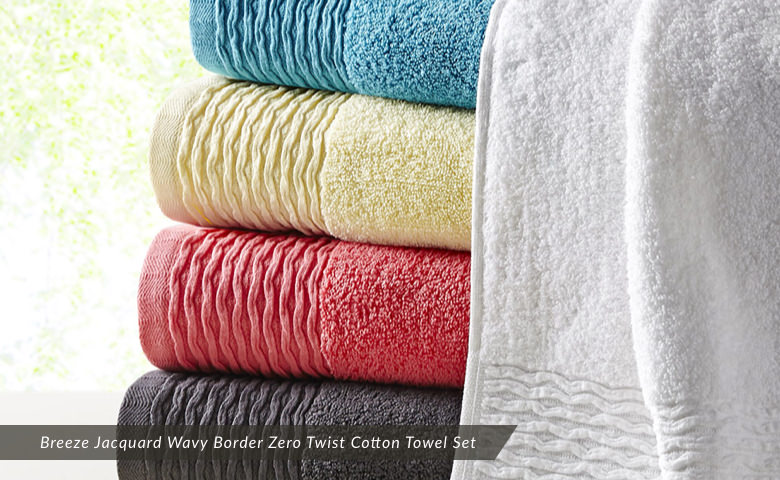
Twist
In twist-constructed cotton fabrics, the cotton fibers have been twisted together. Different rates of twist produce different results. For example, a low-twist yarn, which is an ideal method for fabrics like Turkish and Egyptian cotton that have longer fibers, creates a smooth and soft feel. Higher-twist yarns, on the other hand, result in stronger, more durable towels - but sacrifice that luxuriously soft feel to achieve this durability.
Terry
Terry towels are very common in America and you are bound to come across many of them in your search for the best towel for your needs. Terry towels utilize extra yarn to make loops, which results in the thick, highly absorbent towels that we are familiar with finding in most bathrooms today.
Turkish Cotton vs Egyptian Cotton
We’ve arrived at our main act! Now that you are well-informed when it comes to the types of towels available and their constructions, it is time to dive into what we all came here for, Turkish vs Egyptian cotton towels. First, let’s break down each material:
Turkish Cotton
Turkish Cotton simply refers to a variety of cotton that is grown and harvested in Turkey. Because of the specifics of Turkey’s unique climate, this cotton grows differently from cotton in other regions of the world. In general, the fibers of Turkish cotton are longer and stronger than those of most other types of cotton. The fibers of Turkish cotton are quite smooth with very little ‘fuzz’. Because they are long, they are quite absorbent. But their smoothness does detract somewhat from how absorbent they are. This is not necessarily a downfall when we are talking about towels, and we will get to the details of how that works later. In general, the key point to understand about Turkish cotton is that the fibers are long, strong, and sleek.
Egyptian Cotton
Egyptian cotton is somewhat similar to Turkish cotton in that the unique growing conditions of Egypt allow for a superior quality cotton to be produced which features longer fibers. Because of the extreme heat and humidity of the Egyptian region where cotton is grown, these kinds of cotton are able to develop long, durable fibers - which in turn result in the super soft and durable linens that Egyptian cotton is known for. Generally, Egyptian cotton has even longer and stronger fibers than Turkish cotton. Additionally, Egyptian cotton fibers are a bit thicker and have more texture than their Turkish counterparts, which makes them more absorbent. As you will see in the next section, this difference in absorbency leads to the main difference between Turkish and Egyptian cotton towels.
Turkish vs Egyptian Cotton Towels
Now that we have a good understanding of the primary differences between these two unique cottons, we can dive into how these differences result in a different towel. Read on for more!
Egyptian Cotton Towels
Egyptian cotton towels are an excellent choice - if your intended use fits the bill. As we just learned, Egyptian cottons feature long, dense threads that are highly absorbent. This makes the towels produced with these cottons fantastic at wicking away moisture - whether it be from your body after a long shower or cleaning up a spill in the kitchen. However, the density of these threads also means that Egyptian cotton towels are great at holding moisture in once they become wet. What does this mean for their application in your life? It means that Egyptian cotton towels are great for times when you need a highly absorbent towel, and you can provide it a resting place to dry out quickly.
If an Egyptian cotton towel does not have a proper place to dry out after use, it can quickly develop mold and mildew and begin to smell quite unpleasant. In fact, Egyptian cotton towels are known to be so absorbent that they are oftentimes not recommended for use in highly humid climates, such as those found near the equator, and even tropical or near-tropical regions of America such as Hawaii, Florida, and parts of the gulf coast. In these areas, not only do Egyptian cotton towels have trouble drying out after use, but they are so absorbent that they can actually wick moisture out of the air and become damp without even being used! In more arid climates, however, it is hard to go wrong with super soft, durable, absorbent Egyptian towels.
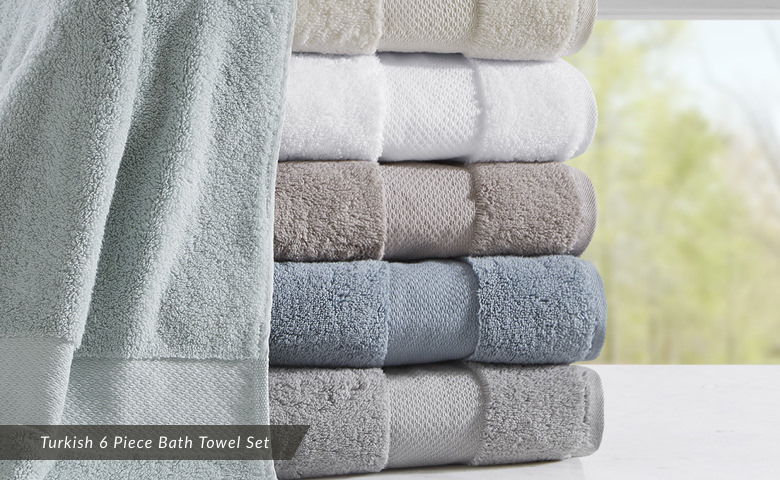
Turkish Cotton Towels
Towels constructed with Turkish cotton are, you guessed it, a bit less absorbent than their Egyptian counterparts. However, the smooth, long nature of Turkish cotton fibers makes for a towel that is both strong and quick-drying. For humid climates and applications when you need a quick-drying towel, Turkish cotton is the way to go. Plus, because washing the towel helps to scruff up the individual fibers a bit, these towels become more absorbent with use. This is a great and unique benefit of Turkish cotton towels, and they could be called the ‘fine wine’ of the towel world, as they get better with age.
So, Which is Better? Turkish or Egyptian Cotton?
When shopping for towels and bath towels, Turkish vs Egyptian cotton becomes an intriguing debate. In the end, the difference between Turkish and Egyptian cotton towels can be boiled down to absorbency and speed of drying. While both cottons offer long, absorbent fibers, Egyptian cotton tends to be more absorbent and slower to dry; while Turkish cottons are slightly less absorbent and are quick to dry. The answer to which material is superior will always boil down to your specific application and what kind of climate you intend to use the towel in. Both are great choices and the climates in both Turkey and Egypt are conducive to high-quality cotton, so you know you will be receiving a superior product no matter what. Shop now to find great deals on high-quality Turkish and Egyptian cotton towels today!